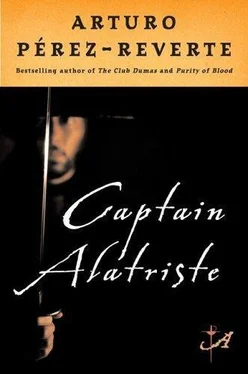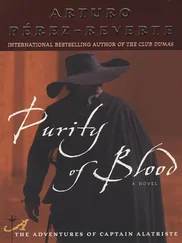Arturo Perez-Reverte - Captain Alatriste
Здесь есть возможность читать онлайн «Arturo Perez-Reverte - Captain Alatriste» весь текст электронной книги совершенно бесплатно (целиком полную версию без сокращений). В некоторых случаях можно слушать аудио, скачать через торрент в формате fb2 и присутствует краткое содержание. Жанр: Старинная литература, на английском языке. Описание произведения, (предисловие) а так же отзывы посетителей доступны на портале библиотеки ЛибКат.
- Название:Captain Alatriste
- Автор:
- Жанр:
- Год:неизвестен
- ISBN:нет данных
- Рейтинг книги:3 / 5. Голосов: 1
-
Избранное:Добавить в избранное
- Отзывы:
-
Ваша оценка:
- 60
- 1
- 2
- 3
- 4
- 5
Captain Alatriste: краткое содержание, описание и аннотация
Предлагаем к чтению аннотацию, описание, краткое содержание или предисловие (зависит от того, что написал сам автор книги «Captain Alatriste»). Если вы не нашли необходимую информацию о книге — напишите в комментариях, мы постараемся отыскать её.
Captain Alatriste — читать онлайн бесплатно полную книгу (весь текст) целиком
Ниже представлен текст книги, разбитый по страницам. Система сохранения места последней прочитанной страницы, позволяет с удобством читать онлайн бесплатно книгу «Captain Alatriste», без необходимости каждый раз заново искать на чём Вы остановились. Поставьте закладку, и сможете в любой момент перейти на страницу, на которой закончили чтение.
Интервал:
Закладка:
"Here you have your man," said Guadalmedina sarcastically, indicating the captain.
The Englishmen had cleaned up and rested from their journey. Their clothing had been brushed and was reasonably presentable, and the younger man was wearing a folded cloth around his neck, supporting the arm on the side of his injury. The other Englishman, the one in gray, whom Alvaro de la Marca had identified as Buckingham, had recovered an arrogance that Alatriste did not recall having seen during the fracas in the lane.
George Villiers, Marquis of Buckingham, was already the Lord High Admiral of the English fleet and enjoyed considerable influence in the circle around King James the First. He was ambitious, intelligent, romantic, and adventurous, and it would be only a brief time before he received the ducal title by which history and legend would know him. Now, still young, and quickly ascending toward the highest levels in the Court of Saint James's, he showed obvious annoyance as he stared at his attacker, but Alatriste bore his inspection without wincing. Marquis, archbishop, or villain, this fine-looking fellow brought neither heat nor chill to the captain, be he favorite of King James or first cousin to the pope. It was Fray Emilio Bocanegra and the two masked men who would keep Alatriste from sleeping that night and, he feared, for many more.
"You came close to killing us tonight in the lane," the Englishman said very serenely in his heavily accented Spanish, addressing himself more to Guadalmedina than to Alatriste.
"I regret what happened," the captain replied evenly, with a nod. "But we are not all privileged to do as we will with our swords."
The Englishman stared at him a few instants longer. Scorn was apparent in his blue eyes; all the surprise and spontaneity of the first moments after the struggle in the lane had vanished. He had had time to think things over, and the recollection of having found himself at the mercy of an unknown swordsman wounded his self-esteem. Thence the newly emerged arrogance, which Alatriste had not so much as glimpsed when they crossed blades earlier in the lantern light.
"I believe we are even," Buckingham said after a moment. And turning abruptly, he began to put on his gloves.
Beside him, the younger Englishman, the purported John Smith, his brow clear, white, and noble, his features finely chiseled, stood in silence. Despite the traveling clothes, the delicate hands and elegant stance betrayed from afar that he was a young man of distinguished family. Beneath his smooth mustache the captain glimpsed the suggestion of a smile. Alatriste nodded again and was about to leave, when the still-unidentified man spoke a few words in his language that made his companion turn toward him. Out of the corner of his eye, Alatriste saw Guadalmedina smile: in addition to French and Latin, he spoke the heretics' tongue.
"My friend says that he owes you his life." George Villiers appeared uncomfortable. As far as he was concerned, the conversation was clearly closed, but grudgingly he translated the younger man's words. "He says that the last thrust from the man in black would have been lethal."
"Possibly." Alatriste, too, allowed himself a slight smile. "We all were blessed tonight, I believe."
The Englishman finished fitting on his gloves as he listened carefully to what his companion told him.
"My friend would like to know what it was that made you reconsider and change sides."
"I have not changed sides," said Alatriste. "I am always on my own. I hunt alone."
As his friend translated, the younger man studied the captain thoughtfully. Suddenly, he seemed more mature and more authoritative than his companion. The captain had observed that even Guadalmedina deferred to him more than he did to Buckingham. Then the younger man spoke again, and his companion protested in their language, as if he did not agree that he should translate those last words. But his friend insisted, with a tone of authority that Alatriste had not heard from him before.
"The gentleman says," Buckingham translated, unwillingly, in his broken Spanish, "that it does not matter who you are or what your office may be, only that you acted nobly when you saved him from being killed like a common dog, a victim of treachery. He says that despite everything, he considers himself in your debt and wants you to know... He says ..." The translator hesitated a moment and exchanged a worried glance with Guadalmedina before he continued. "He says that tomorrow all Europe will know that the son and heir of King James of England is in Madrid with the sole escort and company of his friend the Marquis of Buckingham.... And he says that though for reasons of state it is impossible to publish what happened tonight, he, Charles, Prince of Wales, future King of England, Scotland, and Ireland, will never forget that a man named Diego Alatriste could have killed him, but chose not to."
VI. THE ART OF MAKING ENEMIES
The next morning Madrid awakened to the incredible news. Charles Stuart, cub of the English lion, impatient with the pace of matrimonial negotiations with the Infanta dona Maria, sister of our King Philip the Fourth, had with his friend Buckingham conceived this extraordinary and preposterous project of traveling to Madrid, incognito, to meet his future bride. In so doing, he hoped to transform the cold diplomatic exchanges that had been languishing for months in the chancelleries into a novel of chivalric love.
The marriage between the Anglican prince and the Catholic princess had at this point become a complicated imbroglio in which ambassadors, diplomats, ministers, foreign governments, and even His Holiness the Roman Pope were caught up. The pope would have to authorize the union and was, of course, angling for the largest slice of this tasty pie. So, impatient that no one was flushing his partridge—or whatever those accursed English hunt—the Prince of Wales, seconded by Buckingham, had with his boyish imagination devised a plan to hasten negotiations. Between them they had plotted, confident that traveling to Spain without notice or protocol would immediately conquer the Infanta, and they would carry her off to England before the astonished gaze of all of Europe, and with the applause and approval of the Spanish and English peoples.
That, more or less, was the heart of the matter. Once King James's initial resistance had been overcome, he gave both youths his benediction and authorized them to set out. Though the risk of his son's undertaking was great—an accident, failure, or a Spanish rebuff would put England's honor on the line—the advantages of achieving a happy ending balanced the risk. First of all, to have the monarch of the nation that was still the most powerful in the world as brother-in-law to his heir was not a small thing. In addition, the marriage, desired by the English court but received more coolly by the Conde de Olivares and the ultra-Catholic counselors of the King of Spain, would put an end to the old enmity between the two nations. Consider, Your Mercies, that barely thirty years had gone by since the defeat of the Invincible Armada; and you know how that went, with cannon shot here and the briny deep there. Yes, the Devil takes all, in that fatal arm-wrestling contest between our good King Don Philip the Second and that redheaded harpy named Elizabeth of England, harborer of Protestants, bastards, and pirates, and better known as the Virgin Queen, though be damned if it is possible to imagine her Virgin anything.
The fact is that a wedding between the young heretic and our infanta—who was no Venus but was not all that bad, if you go by how Diego Velazquez painted her a little later, young and blonde, a lady... with that very Hapsburg lip, of course—would peacefully open the ports of commerce in the West Indies to England, resolving the burning problem of the Palatinate in favor of. the British. That is a story I do not choose to go into here, because that is what history tomes are for.
Читать дальшеИнтервал:
Закладка:
Похожие книги на «Captain Alatriste»
Представляем Вашему вниманию похожие книги на «Captain Alatriste» списком для выбора. Мы отобрали схожую по названию и смыслу литературу в надежде предоставить читателям больше вариантов отыскать новые, интересные, ещё непрочитанные произведения.
Обсуждение, отзывы о книге «Captain Alatriste» и просто собственные мнения читателей. Оставьте ваши комментарии, напишите, что Вы думаете о произведении, его смысле или главных героях. Укажите что конкретно понравилось, а что нет, и почему Вы так считаете.










